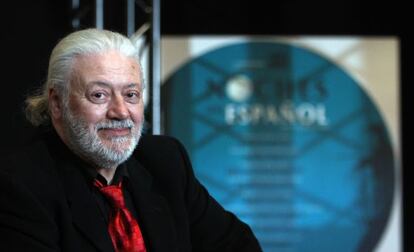Teatro Español chief to bow out
After eight years in charge at the Madrid theater, Mario Gas will leave in July

After eight years, Mario Gas is to leave his post as director of the Teatro Español — but not until July 30. That’s the agreement he has reached with the new head of the Madrid City Hall’s arts department, Fernando Villalonga, and its new performing arts chief, Natalio Grueso (the former director of the Avilés’ Niemeyer Center, which closed under controversial circumstances in December). The theater program planned up to his departure will be respected and his musical Follies, now enjoying a sell-out run, will be revived in June and July.
Gas has been on thin ice ever since Villalonga drew attention to the last contracts signed by his predecessor Alicia Moreno — “a crucial person in Madrid culture,” in Gas’s words. Among the six contracts Moreno signed before she left in the wake of former Mayor Alberto Ruiz-Gallardón’s move to the Justice Ministry was that of Gas, which was extended for four years. According to the explanation offered during a City Council meeting, it was “irregular” because the salary — 101,000 euros a year without counting expenses, travel and his own productions — exceeded the limit stipulated for a top management position by 10,000 euros.
“You’ll have to ask [Villalonga] why he classified the renewal of my contract as irregular, because I don’t think I have ever signed anything irregular,” the director said during a press conference on Tuesday. “The contracts can be interpreted in many ways.”
Asked about the reasons for his departure, he went no further than to say that he was going “because they are changing the structures and they are changing the people, and the new ones want a new team, which is perfectly justifiable.”
“Our salaries are in the same area as all of those in the industry. The salary of the directors of public theaters is trivial. It disgusts me to talk about this — my salary is within what is normally paid. I haven’t stolen from anybody, neither have I cheated anybody and I can get up in the mornings and look at myself in the mirror. […] I am leaving greatly enriched personally, not economically.”
Hired by Moreno in 2004, Gas was responsible for opening the Teatro Español’s Sala Pequeña (or, small hall), which until then had been the theater’s café. He also managed to extend the Español’s program beyond its headquarters in Madrid’s Plaza de Santa Ana to the Arganzuela neighborhood with the so-called Naves de Español spaces, situated in the Matadero Madrid cultural center. He inaugurated them in 2007 with the Bertolt Brecht and Kurt Weill opera Rise and Fall of the City of Mahagonny, which he directed himself.
During his time as the head of Madrid’s flagship theater, he brought to the city productions from the Royal Shakespeare Company, Declan Donnellan, Nick Ormerod’s Cheek by Jowl group and Sam Mendes’ Bridge Project — which included A Winter’s Tale, The Cherry Orchard and The Tempest and featured the likes of Ethan Hawke, Simon Russell Beale, Sinéad Cusack and Rebecca Hall — as well as director Deborah Warner’s Julius Caesar, which starred Ralph Fiennes.
His track record is, no doubt, the reason why directors of other theaters don’t hesitate to offer a positive assesment of his reign. “It has been a brilliant spell in charge, which has given many opportunities to creators, and built a loyal audience with shows of great quality, both Spanish and foreign,” says José Luis Gómez of La Abadía. “We will never be able to thank him enough for having set up the Matadero, which is a very important contribution to the city.”
Gas is one of the most recognized and versatile directors on the Spanish theater scene. Born in Montevideo in 1947 while his father, the actor and singer Manuel Gas, was on tour around South America, he trained in independent and university theater groups in the second half of the 1960s. He has directed more than 100 plays, operas and musicals.
Gas says he is leaving the Español with his work “accomplished.” “We wanted a theater that was alive, open, with multiple, quality, productions in which there was a place for pleasure and reflection and I think that I have been faithful to my promise, but I don’t want thanks from anyone,” he says.
Tu suscripción se está usando en otro dispositivo
¿Quieres añadir otro usuario a tu suscripción?
Si continúas leyendo en este dispositivo, no se podrá leer en el otro.
FlechaTu suscripción se está usando en otro dispositivo y solo puedes acceder a EL PAÍS desde un dispositivo a la vez.
Si quieres compartir tu cuenta, cambia tu suscripción a la modalidad Premium, así podrás añadir otro usuario. Cada uno accederá con su propia cuenta de email, lo que os permitirá personalizar vuestra experiencia en EL PAÍS.
¿Tienes una suscripción de empresa? Accede aquí para contratar más cuentas.
En el caso de no saber quién está usando tu cuenta, te recomendamos cambiar tu contraseña aquí.
Si decides continuar compartiendo tu cuenta, este mensaje se mostrará en tu dispositivo y en el de la otra persona que está usando tu cuenta de forma indefinida, afectando a tu experiencia de lectura. Puedes consultar aquí los términos y condiciones de la suscripción digital.








































